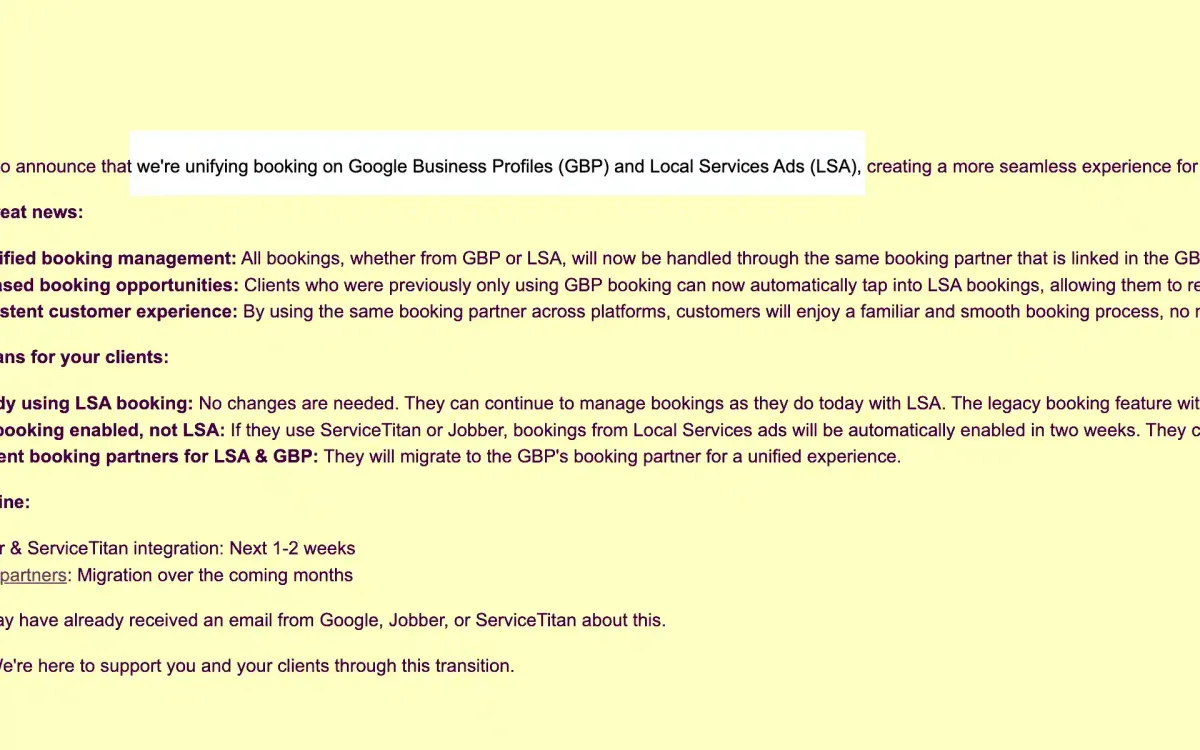
Google is updating its local business platforms. The tech giant is merging the booking systems for Google Business Profiles (GBP) and Local Services Ads (LSA), a move aimed at creating a more cohesive experience for businesses and their customers. This integration represents a notable shift in how local businesses manage their online presence and customer interactions through Google's platforms.
The announcement, made via email to affected businesses, outlines the changes and their implications. According to the communication shared by Ben Fisher on social media platform X, the unification process will roll out gradually, with some integration partners migrating within the next two weeks, while others will transition over the coming months.
Understanding the Changes
The integration primarily affects three groups of businesses:
- Current LSA Booking Users: These businesses will not need to make any changes. They can continue managing bookings through LSA as usual. However, the legacy booking feature with time slots will be replaced by the seamless booking experience currently seen on GBP.
- GBP Booking Users Without LSA: Businesses using Service Titan or Jobber for bookings will have Local Services ads booking automatically enabled within two weeks. Google has provided an opt-out option in LSA settings for those who prefer not to participate.
- Businesses with Different Booking Partners for LSA and GBP: These entities will migrate to the GBP's booking partner to ensure a unified experience across platforms.
Timeline for Implementation
Google has outlined a phased approach for the integration:
- Jobber and Service Titan integration: Expected to complete within the next 1-2 weeks
- Other partners: Migration will occur over the coming months
The company has not provided specific dates for all partners, indicating a flexible timeline that may depend on various factors including technical readiness and partner coordination.
Benefits of the Unified Booking System
Google highlights several advantages of this integration:
- Simplified Booking Management: All bookings, regardless of their origin (GBP or LSA), will be handled through a single booking partner linked to the GBP profile. This centralization aims to reduce complexity for businesses and provide a unified view of appointments.
- Expanded Booking Opportunities: Businesses previously limited to GBP booking can now access LSA bookings automatically, potentially increasing their customer reach.
- Consistent Customer Experience: By utilizing the same booking partner across platforms, customers will encounter a familiar booking process, regardless of how they find the business.
Technical Implications
The merging of these systems represents a significant technical undertaking. It involves integrating two distinct platforms that have historically operated separately. This integration requires careful consideration of data migration, user interface adjustments, and ensuring compatibility between different booking partners and Google's systems.
For businesses using Service Titan or Jobber, the automatic enablement of LSA bookings indicates a deep integration between these third-party services and Google's platforms. This suggests that Google has worked closely with these partners to ensure a smooth transition.
Impact on Local Business Ecosystem
This change has broader implications for the local business ecosystem:
- Standardization: By unifying the booking process, Google is standardizing how local businesses interact with customers online, potentially simplifying the digital landscape for small businesses.
- Data Consolidation: The merger likely means more consolidated data for businesses, offering potentially richer insights into customer booking behaviors across platforms.
- Partner Ecosystem: The phased rollout for different booking partners suggests varying levels of integration complexity, which could impact the competitive landscape among booking service providers.
User Privacy and Data Handling
While the announcement does not explicitly address privacy concerns, the consolidation of booking systems raises questions about data handling and user privacy. Businesses and customers alike may be interested in understanding how their information will be managed across these now-unified platforms.
Market Position and Competition
This move by Google can be seen as a strategy to strengthen its position in the local business services market. By creating a more integrated ecosystem, Google potentially increases the value proposition of its platforms for both businesses and consumers, possibly challenging other players in the local services and booking space.
Future Developments
While this announcement focuses on the immediate changes, it opens the door to speculation about future developments. The unified system could serve as a foundation for more advanced features, such as AI-driven booking optimization or enhanced analytics for businesses.
Key Facts
- Announcement Date: August 29, 2024
- Platforms Affected: Google Business Profiles (GBP) and Local Services Ads (LSA)
- Primary Change: Unification of booking systems across GBP and LSA
- Timeline: Phased rollout, starting with Jobber and Service Titan integration within 1-2 weeks
- Key Benefits: Simplified management, increased booking opportunities, consistent customer experience
- Affected Businesses: Current LSA booking users, GBP booking users without LSA, businesses with different booking partners for LSA and GBP
- Opt-out Option: Available for businesses using Service Titan or Jobber who do not wish to enable LSA bookings

